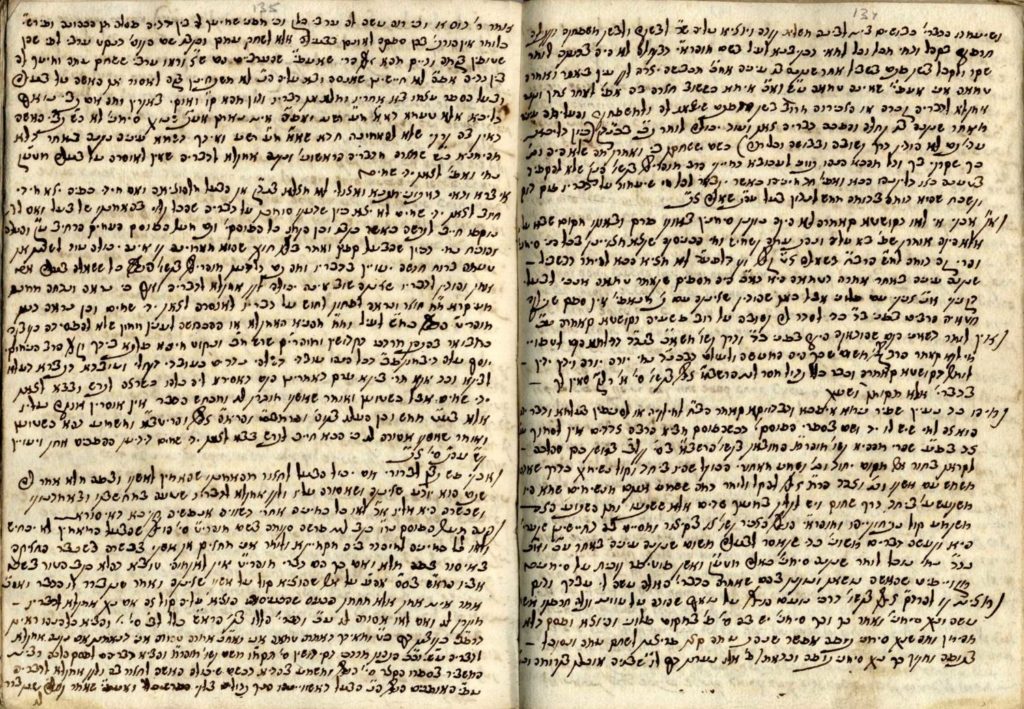
‘Letters’ of Rabbi Shlomo Eliezer Baki, one of the rabbis of Casale, in which he gathered, according to the custom of contemporary scholars, missives, letters, texts of deeds, engagement contracts, letters of recommendation, and the like – and at the beginning, 13 missives from the great controversy about – Rabbi Moshe Chaim Luzzatto – the Ramcha”l.
The ‘Egron’ before us is undoubtedly a treasure trove from the scholars of Italy in the 18th century .
Background about the Ramcha”l controversy : when it became known outside Italy that the Ramcha”l had an angel from heaven who revealed secrets to him and that around him was a group of scholars who studied the secrets of the Torah, the rabbis of Ashkenaz, headed by Rabbi Moshe Hagiz who was then staying in Ashkenaz, decided to come out strongly against the Ramcha”l, fearing that he was a new false messiah.
The rabbi of Ashkenaz wrote to the rabbis of Italy asking them to persecute him to the point of total excommunication, after which a bitter dispute erupted between them for four years straight, and many missives were sent in the meantime as a result of this episode.
In 1937, Dr. S. Ginzburg published a large collection of missives by the Ramcha”l and his contemporaries. The collection before us contains 13 missives from this well-known affair, among them missives by Rabbi Moshe Hagiz, missives by the Ramcha”l, Rabbi Yekutiel Gordon of Vilna, Rabbi Emanuel Kolbo the physician and the scholars of Livorno – four of these 13 missives have not been published in the aforementioned book and were unknown until this Egron .
In this variegated Egron, Rabbi Shlomo Eliezer Baki gathered together a collection of letters of recommendation for the poor, redemption of captives, bridal funds, a letter of recommendation for a woman who was searching for her husband, letters of ordination, acceptance letters and permits for ritual slaughterers, condolence letters, a letter of dismissal, a chalitzah deed, a last will and testament, a deed of sale of a place in a synagogue, warnings to cheese-makers, letters of recommendation for Italian Jews who wanted to immigrate to the Land of Israel, texts of engagement and wedding agreements according to the Mantova custom, and more – some of the letters and ordinations were given to extremely well-known rabbis and personages.
The rabbis of Italy : the Egron contains letters by dozens of Italian rabbis. We shall mention but the most well-known of them: Rabbi Yitzchak Lampronti (author of Pachad Yitzchak ), Rabbi David Finzi (the Ramchal’s father-in-law), Rabbi Binyamin HaKohen – the Raba”ch, his son-in-law Rabbi Yeshayahu Bassan (author of Lachmei Todah , the Ramcha”l’s rabbi), his son Rabbi Yisrael Binyamin Bassan, Rabbi Shimshon Morpurgo (author of Shemesh Tzedakah ), Rabbi Aviad Sar Shalom Basil (author of Emunat Chachamim ) , Rabbi Shimshon Chaim Nachmani (author of Zera Shimshon ), Rabbi Yaakov Abuhav – Av Beit Din of Venice, Rabbi Avraham Segre, Rabbi Yehoshua Segre, Rabbi Menashe Yehoshua of Padova, Rabbi Shabtai Elchanan of the elders, Rabbi Mordechai Tzahalon of Ferrara, Rabbi Natan Finkleri, Rabbi Yuda Mindola, Rabbi Gabriel Pontrimoli, Rabbi Eliyahu HaLevi Av Beit Din of Alessandria and many more.
Among the letters, there are also two missives by Rabbi David di Silva, son of Rabbi Chizkiyah di Silva, author of Pri Chadash . The first, to Rabbi Avraham Segre about his difficult economic situation with a description of his efforts to print his father’s books – Pri Chadash and Mayim Chaim, and the second, a letter of recommendation for Rabbi Yehoshua ibn Ezra.
The missives were printed in the Metzudah anthology (Tel-Aviv 1945), pp. 213 and onward.
The vast majority of the letters are from the 1730s.
244 pages, approximately 50 of which are blank. 20×14 cm. Eloquent rabbinical Italian script.
Very fine condition. Aging stains. Magnificent new leather binding.
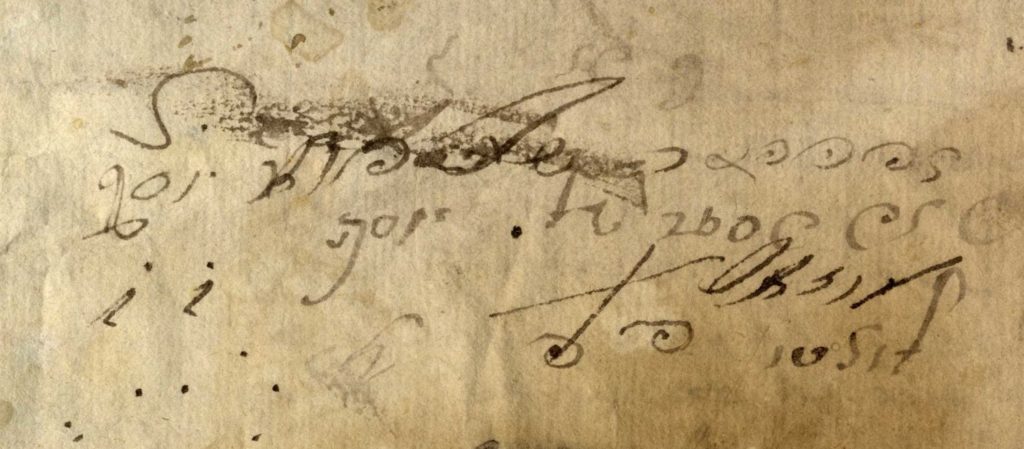
Seder Zeraim and Moed, bound together, with the commentary of Rabbi Ovadya of Bartenura and the Tosafot Yom Tov. Wilhermsdorf, [1681-1682].
The interior pages bear dozens of glosses and comments written by Torah scholars with references to the Yerushalmi and commentaries, in addition to various elucidations. The comments were mainly written in Hebrew, with a few in Italian.
Owner signatures of Yosef Luzzatto, from the of the Ramcha”l’s family. Additional signatures in Hebrew and Italian.
[2], 118, 153 leaves. 20 cm. Aging stains. Tears in the margins of the leaves, some detached, some affecting text. Wooden boards covered with broken, worn leather. Overall moderate condition. Missing title page of Seder Moed.
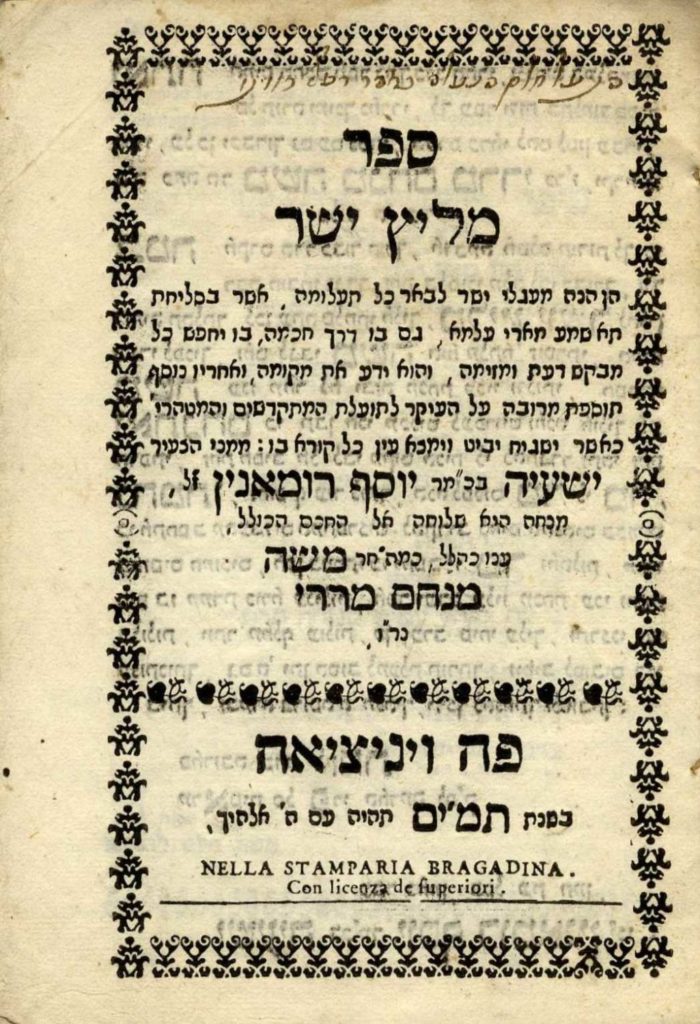
Rabbi Yeshaya Romanin was a disciple of the Ramchal’s. In an interesting twist, he dedicated this work to Rabbi Moshe Menachem Merari. Rabbi Moshe was among the Viennese rabbis who forced the Ramcha”l to swear that he would stop publishing kabbalistic works and even removed his books from circulation, just a short time after this book was published.
In 1727, the Ramcha”l was visited by the “Maggid” who disclosed many kabbalistic secrets to him. He concealed these visits for about half a year, but then told a few of his disciples about them. The news spread until it was heard by Rabbi Moshe Chagiz, a primary opponent of Sabbateanism. Rabbi Moshe Chagiz then turned to the Viennese rabbis with letters cautioning them about the Ramcha”l. The ensuing polemic grew to encompass most of the Italian rabbis. At the end, in Av 1730, the Ramcha”l was forced to stop studying kabbalah and all of his writings were locked in a trunk. Rabbi Moshe Menachem Merari was one of the rabbis who signed opposing the Ramcha”l. The author, who was a disciple of the Ramcha”l’s and whose book bears a poem by the Ramcha”l, dedicated his work to Rabbi Merari. The book indicates that up until just a few months before the polemic, the Ramcha”l was still completely accepted amongst the Viennese rabbis, and it was only at the very end of 1730 that Rabbi Moshe Chagiz started the call to oppose him.
The book itself is a commentary on the “Ta Shema” selichah authored by Rabbi Ephraim of Bonn. The text of the annulment of vows was added at the end of the book.
17 leaves, 34 pages, 17 cm. The title notes:”הגיע לחלק הנעלה מוה”ר רפאל רוויגו.” Very fine condition. Minimal aging stains, cardboard binding.
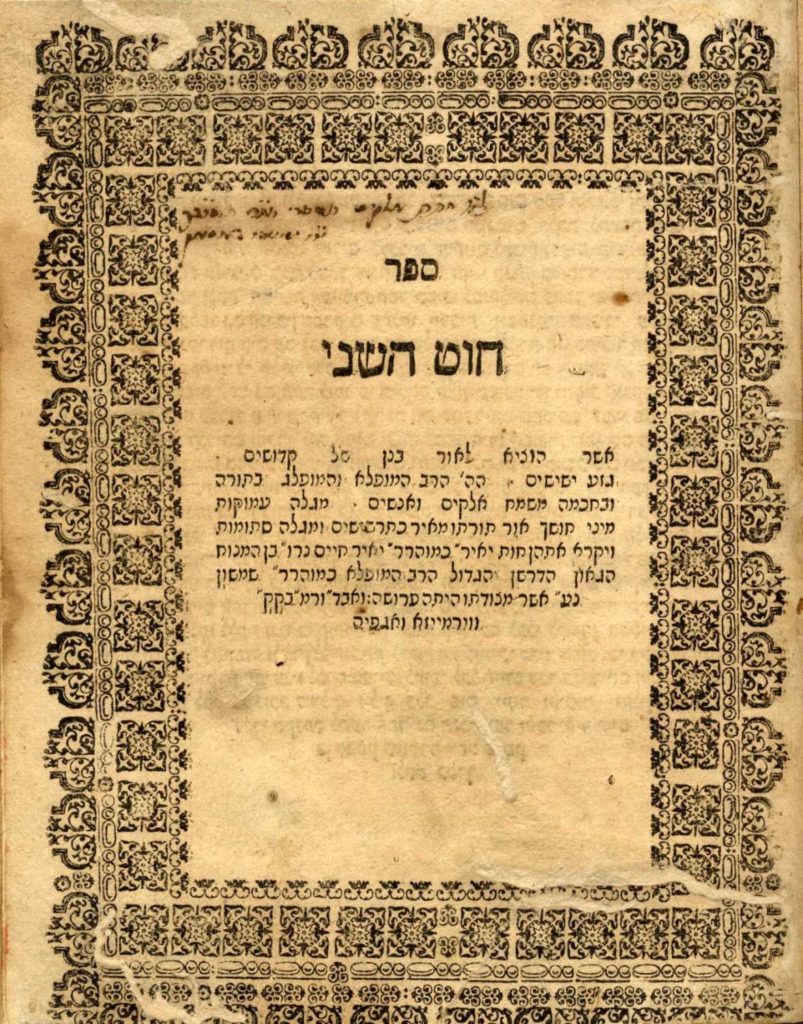
Chut HaShani. Responsa by Rabbi Moshe Shimshon Bachrach and Rabbi Shmuel Avraham Bachrach, published by his son and grandson Rabbi Yair Bachrach (author of Chavat Yair ) with responsa by him. [1679]. First edition. Copy which belonged to Rabbi Binyamin HaKohen – Maharba”ch, with the handwritten signature of Rabbi Yeshayah Bassan.
Rabbi Yair Bachrach published his father’s and grandfather’s responsa and added some of his own responsa to them. With an important preface by him. In Siman 10, a responsum by Rabbi Yeshayah HaLevi Horowitz, author of the Shla”h, was printed. The final responsum (Siman 97) is a compilation by Rabbi Yair Bachrach about the Sages’ dimensions and weights.
On the title page of the book, the handwritten signature of Rabbi Yeshayah Bassan indicates that the book had belonged to his father-in-law Rabbi Binyamin Cohen (Maharba”ch).
Rabbi Yeshayah Bassan (1673-1739) was one of the leading adjudicators of Italy, and also a poet and kabbalist. He was a disciple of Rabbi Yehudah Briel and the Reme”z, and the son-in-law of Rabbi Binyamin Cohen – Raba”ch. He served as a rabbi in several Italian communities and eventually became the rabbi of the Reggio community. He was the primary rabbi of the Ramcha”l. Most of his compositions remained in manuscript form.
Rabbi Binyamin HaCohen Vitali of Reggio , also known as the Marba”ch (1651-1727), was one of the leading kabbalists of Italy and the primary disciple of Rabbi Moshe Zacuto – the Reme”z. He was the rabbi of Alessandria and then of Reggio. He authored the books Gevul Binyamin , Alon Bachut and several prayer and Tikkunim books. Recently, responsa by him have been printed in Shu”t HaRaba”ch .
92, 95-115 leaves, 18 cm. Moderate condition. Aging stains and worming holes. New half-leather binding.
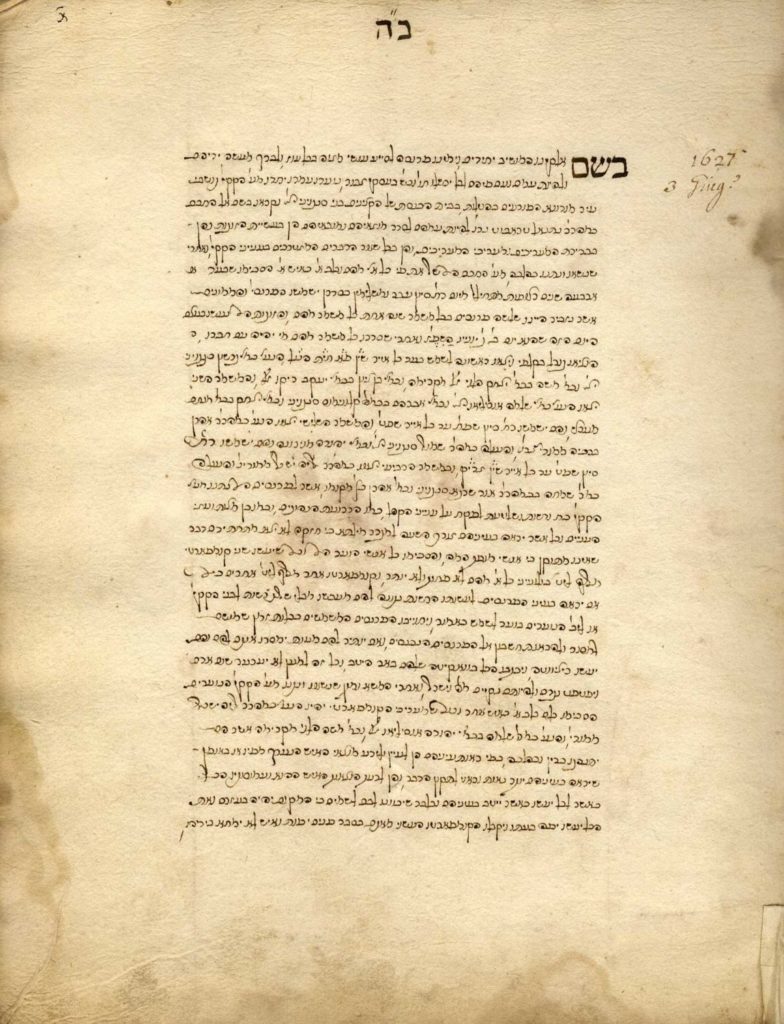
Rare and special historic ledger with regulations and bylaws related to tax assessments and the appointment of tax collectors and assessors in the Jewish community in Modena, for government taxes. With signatures of the sages of the city, Rabbi Aharon Berachiah of Modena, author of Maavar Yabok ; his brother-in-law, Rabbi Yosef Yedidyah Karmi, author of Kenaf Renanim ; great rabbi of Modena, Rabbi Netanel Trabot and others.
Tax payments (income, business and estate) in the Jewish communities of Italy were designated according to the value of the payer’s assets. Each person would appraise his property and the tax assessor would confirm this evaluation. The bylaws were designated from time to time by the city sages, and members of the committee. They designated what was included in assets, how the value was determined, the assessors and other directly and indirectly related subjects. On occasion, there were objections to an assessment and the sages had to study these cases and decide whether the tax assessor or taxpayer was correct.
This ledger includes all the bylaws and decisions reached at these meetings, the appointment of assessors and a list of the names of the Jews in the city and its environs and the assessed value of their properties.
In addition, it includes a copy of a letter sent in 1629 by the heads of the committee to the Duke of Modena regarding a decision about the “redemption of the wretched captives of the Fanio family who are imprisoned …” and more. Meetings were held in different synagogues or at the home of the rabbi of the city, Netanel Trabot (refer to leaf 34b).
Rabbinical signatures from:
Rabbi Netanel Trabot, early prominent Modena rabbi who was born in 1590. His father was Rabbi Binyamin Trabot son of Rabbi Ezra son of Rabbi Yechiel Trabot, grandson and disciple of the Mari”i Kolon, author of Shu”t Maharik . His responsa appear in the works of the sages of his time and the Chid”a testifies that he saw a book of his responsa in manuscript. He passed away in 1660.
His signatures appear on leaves: 15b: 18a: 25a: 40b with an addition of a line and a half in his hand.
Kabbalist Rabbi Aharon Berachiah of Modena, author of Maavar Yabok , was the disciple of the Rem”a of Fano and the Mahar”i Sruk, disciple of the Ariza”l. Rabbi Aharon Berachiah was chosen by the members of the committee to organized the “Torah of the assessment” in 1636 (refer to the decision regarding his appointment on leaf 29b). His signature appears at the end of the “assessment” on leaf 34b with an additional 4 lines in his holy hand, and another one of his signatures on leaf 44b, together with the aforementioned Rabbi Netanel Tarbot.
Kabbalist Rabbi Eliezer Nachman Foa, disciple of the Rem”a of Fano, leading kabbalist in Italy, author of Medrash B’Chiddush and more. Rabbi Eliezer Nachman was an arbitrator from Reggio, the community next to Modena. His signature appears in the ledger on leaves: 15b, 17a, 18a, 40b – where he explicitly signs: מבורר מק”ק רייו [Arbitrator of Reggio].
Rabbi Yosef Baruch son of Yedidyah Zecharya of Urbino , one of the rabbis of Modena. He was the son-in-law of Rabbi Netanel Tarbot and also served as the community scribe. He started his work in Kislev, 1632, refer to leaf 15a. For more information, refer to Neppi-Girondi, Toldot Gedolei Yisrael B’Italia, p. 177:88 and p. 210:237.
Rabbi Yehudah Aryeh Poggetti , Modena rabbi and community scribe, son of Rabbi Yaakov Poggetti, author of Kitzur Reishit Chochmah . He received rabbinic ordination from Rabbi Netanel Tarbot and signed together with him on many halachic decisions. He passed away in 1646. (Ibid, p. 173:77 and Asufot II p. 105).
Leaf 8b apparently bears the copy of the signature of Rabbi Yosef Yedidyah Carmi – disciple of the Rem”a of Fano, author of Kenaf Renanim , brother-in-law of the author of the Maavar Yabok . Leaf 9a features a protocol of a meeting from 1630, which appointed Rabbi Yosef Yedidyah to arrange the assessment.
46 leaves. Ink on paper. 26x20cm. Thick paper, wide margins. Very fine condition. Minimal aging stains. Old cardboard binding. Handwritten ledger in Italian with a summary of the main points and dates from the ledger of the Modena community included.
Rare, important ledger regarding Jewish history in Italy in general and Modena in particular.
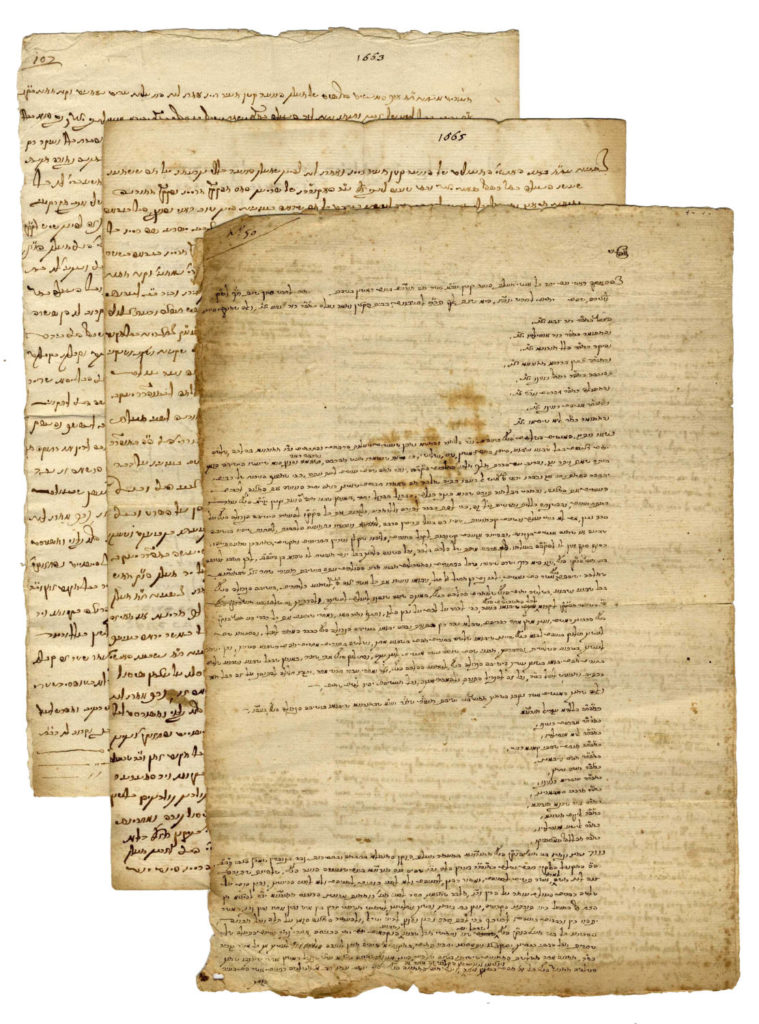
Protocol of the meeting of the “Vaad Katan” in Modena with names of the participants and decisions they reached regarding studies at the Meirei Shachar yeshivah and the beit din arrangements. “Upon the meeting of the ‘Vaad Katan’ leaders’ gathering here in Modena on Sunday … Sivan [1660] in the home of the minister David Tzeva …”
The decision to designate rabbinical courts and various related arrangements was made with the participation of kabbalist Rabbi Binyamin HaLevi (disciple of the Ariza”l, teacher of Reme”z), a visitor from Safed. The protocol states: “Along with the leaders of … Modena … the presence of the wondrous in wisdom and piety … from the Holy Land … the G-dly kabbalist, wise and perfect Rabbi Binyamin HaLevi … who was in Modena when this committee met …” Rabbi Hillel Modena, son of the author of Maavar Yabok , was included among the other participants at the gathering.
The Meirei Shachar Yeshivah : In 1614, the great kabbalist Rabbi Aharon Berachia of Modena established the Meirei Shachar Society. Its goal was to awaken at midnight to sing in honor of Hash-m. It seems that the yeshivah’s activities extended to daytime study of the Talmud.
Along with two other documents – authorizations regarding tax payment collected by the “Vaad Katan” of Modena for [1662-1665]. The authorization from 1665 is signed by witnesses: Moshe Fuah, Yehudah Korayo, Yehudah Rabbeinu, Shlomo Galiko.
[6] pages. 28×19 cm. Fine condition. Minimal stains and tears without blemish to the text.
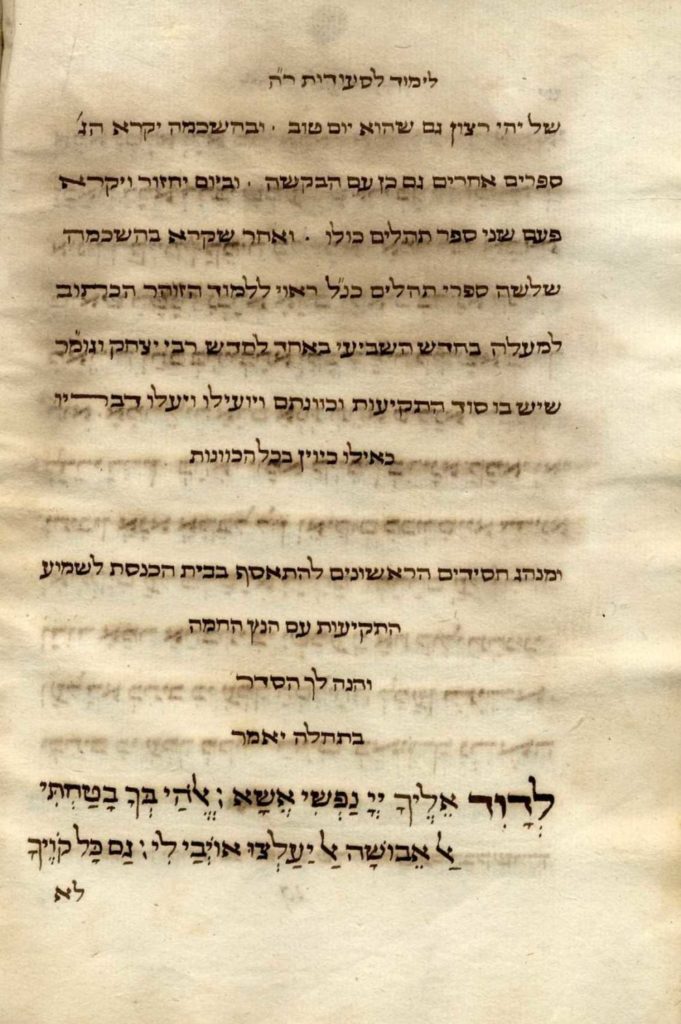
Compilation of prayers, supplications, liturgical poetry, study passages and readings for Rosh HaShanah and Yom Kippur according to the customs of the kabbalist Sephardim of Italy.
Includes: Intentions for Keri’at Shema, prayer for livelihood, the order of the Rosh HaShanah meal with all the significant omens, the order of the shofar blowing with sunrise – see below. The order of the shofar blowing with (kabbalistic) intentions, a prayer preceding the prayers, Eliyahu’s prayer, a prayer for removing the Torah from the ark, prayers and selichot for Yom Kippur and for the Ne’ilah prayer.
Seder Teki’ot L’Netz HaChammah (the order of Shofar blowing with sunrise) – the custom and the polemic.
On leaves 19b-26a, ‘Seder Teki’ot L’Netz HaChammah’ was written with the kabbalistic intentions for the shofar blowing. Written at the top: ‘A custom of the early pious ones is to gather in the synagogue to hear the shofar blowing with the sunrise, and this the order.’ This custom to blow the shofar with the sunrise on Rosh HaShanah – before prayers – was common among the kabbalist Sephardim as well as among the kabbalists of Italy. It was also the custom of the Reme”z and his disciple the Raba”ch. However, the Chid”a wrote that this blowing of the shofar has no source in the words of the Ar”i, z”l, and although one of the leading rabbis of Italy wrote him reliable sources for this custom, he did not accept his words and did not find support for them in the Ar”i’s writings. He therefore wrote that the custom should be cancelled, and this is what he heard from our rabbi the Rasha”sh [see his book of responsa, Chaim Sha’al , section II, Siman 10, letter 3]. Enclosed is an article about the custom and the polemic against it.
102, [1] leaves. 19×12 cm. Straight, neat vowelized block script. On the three final pages: ‘Prayer for the earthquake B”M [Bar minan]’ in Italian script. Fine condition. Aging stains. Original detached leather binding.
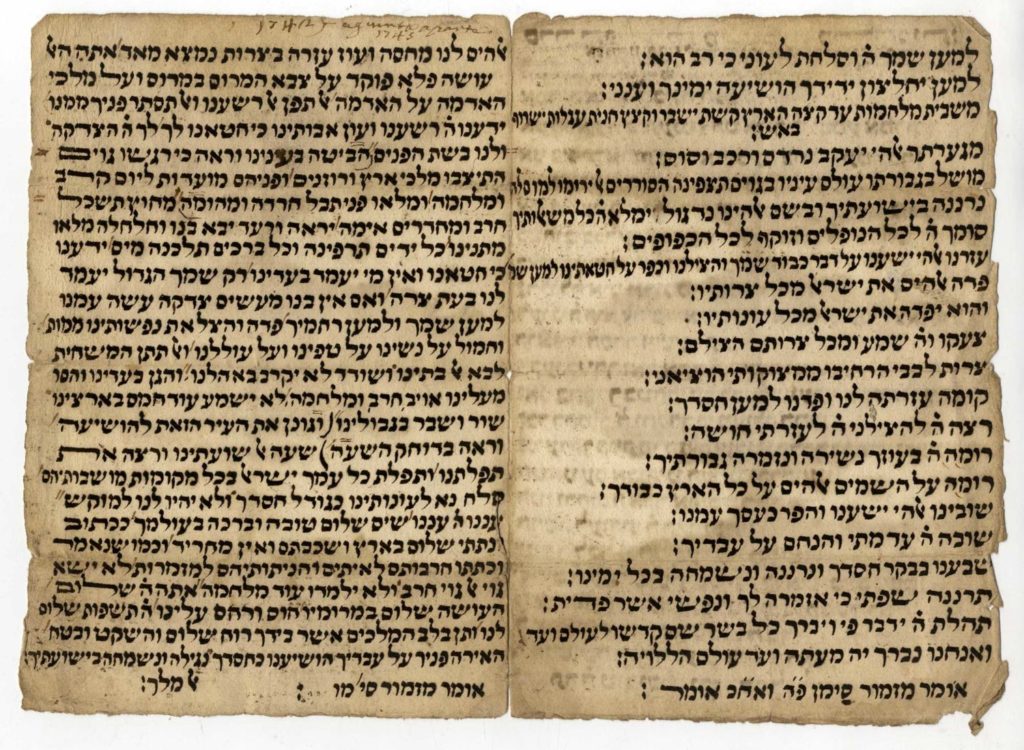
Scribal manuscript including a list of chapters of Psalms followed by verses of Psalms arranged in double alphabetical order, with a selichah that starts: “א-להים לנו מחזה ועוז” [“E-lohim lanu machazeh v’oz”].
A similar prayer book was printed with the title ” Seder Mivakshei Shalom ” in Mantua in 1733.
[3] pages, ink on paper. 15×22 cm. Fine condition. Aging stains. Light tears.
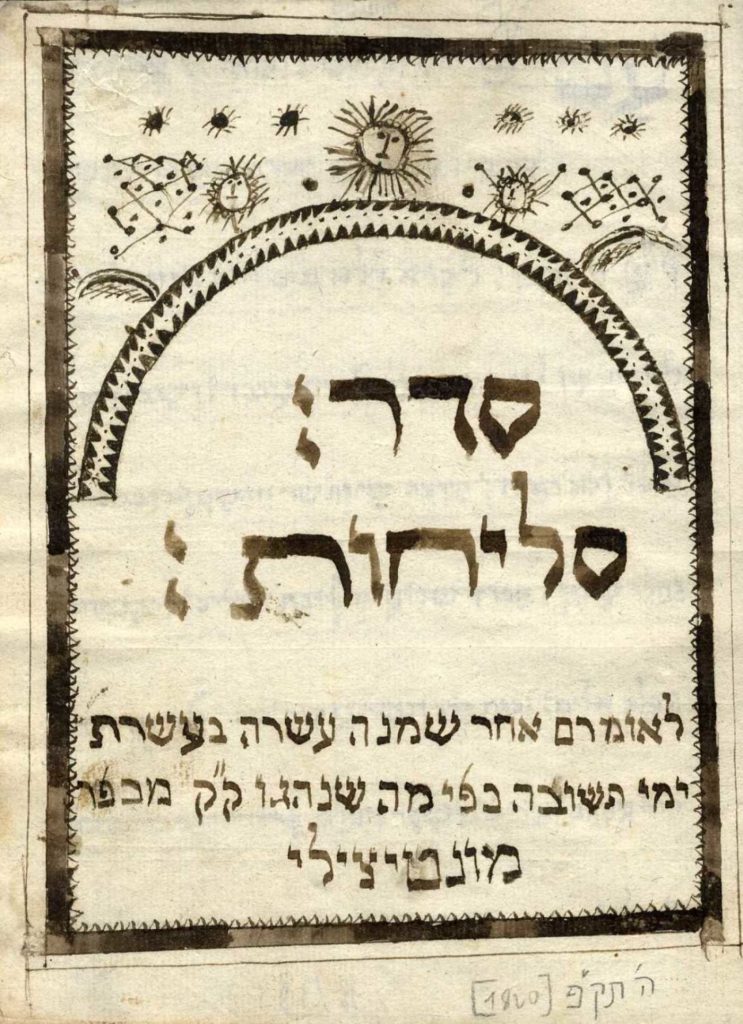
“The order of Selichot to be recited after Shmoneh Esreh during the Days of Penitence according to the custom of the holy community of the village of Monticello”, “The order of Tachanunim to be said during the month of Elul after minchah and during the Days of Penitence, mine, written and signed by Yosef Yechiel Osimo.”
Monticello is a village in northern Italy, near the city of Parma. This book is one of the solitary remnants from the Jewish community there.
[12] leaves. Ink on paper. 14×17 cm. Beautiful, refined scribal block script, vowelized and with letters in calligraphy.
Very fine condition. New cardboard binding.
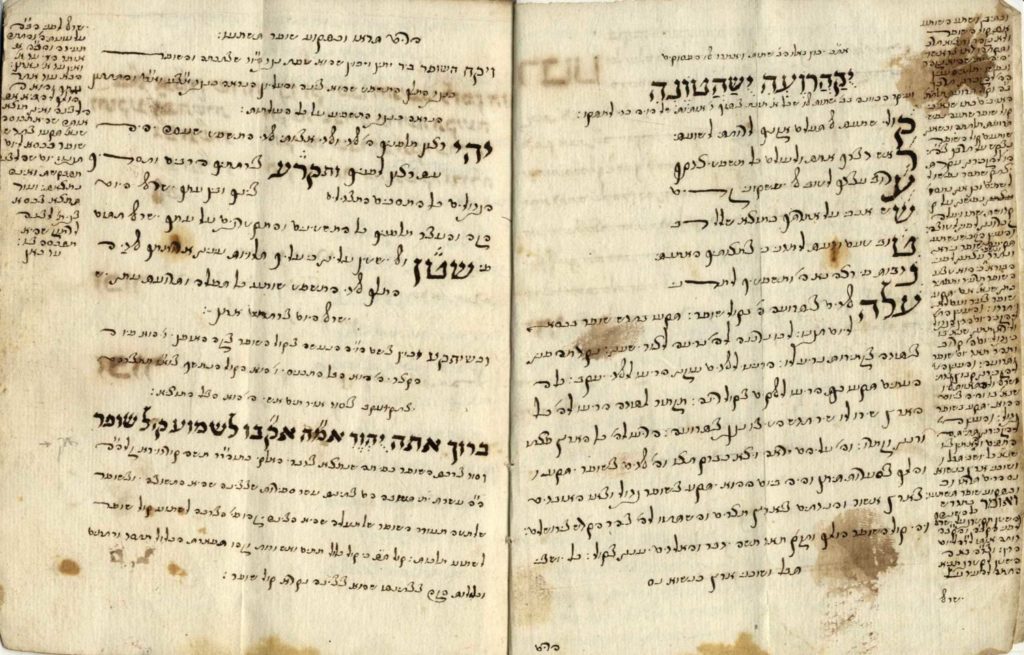
Arrangement of p rayers and intentions for the shofar-blower according to the Safed custom, and arrangements of selichot for the high holidays and various liturgical poems for Rosh HaShanah, Yom Kippur and Simchat Torah. The last prayer is from the book Chemdat Yamim .
[22] pages. 17×13 cm. Italian script with marginal notes.
Fine-very fine condition, few stains. The last page is slightly worn. New half-leather binding.
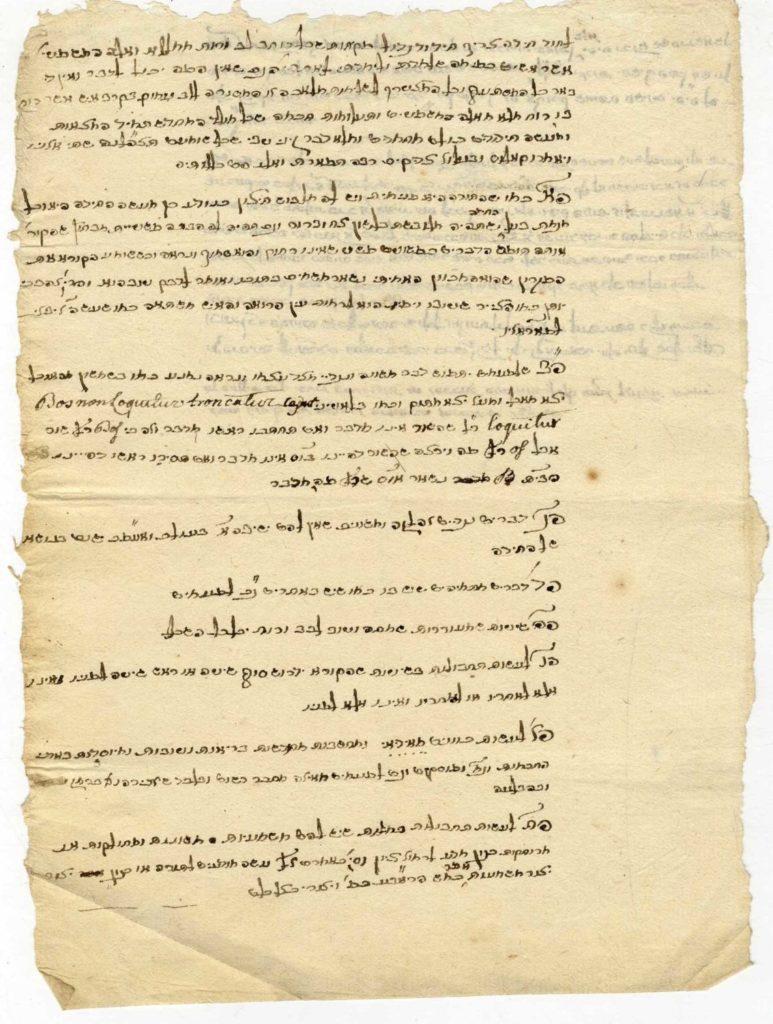
Darkei HaChidah , ten rules and concepts necessary for formulating a riddle, by the kabbalist Rabbi Eliyahu HaLevi, rabbi of Alessandria, signed autograph: “זה אל”י.”
Rabbi Eliyahu HaLevi Segal 1713-1792 was among the rabbinical leaders of Italy in his time. He was born in Finale and was a disciple/colleague of Rabbi Yitzchak Lampronti. They both studied under Rabbi Y. Brielle. He was rabbi and rosh yeshivah in Alessandria, an adjudicator and kabbalist. The Chid”a wrote regarding him in a halachic responsum ( Chaim Shaal , section II, siman 10): “The elder esteemed rabbi Eliyah HaLevi z”l rabbi of the Alessandria community sent to me”). In the book Toldot Geonei Italiah it says: “And I, the youth Mordechai Girodni, heard wondrous things from Rabbi Eliyahu HaLevi, of his piety and sanctity, who rescued his flock from much distress with the power of his special prayers.” Rabbi M. Sh. Girondi writes of him: “The gaon famed in Torah, piety and extreme humility, the G-dly kabbalist, the glory of Torah.” He composed many works, including Seder D’Eliyahu , Shirim V’Chidot . Also, in manuscript: Kursa D’Eliyahu – which is mentioned by the Chid”a; Shu”t Eliyahu B’Arba and more. Material about him is enclosed, as well as letters sent to him by the Chid”a. Refer to Kovetz Sinai volume 71, pages 163-165.
[2] pages. Ink on paper. 18×25 cm. Unaligned margins. Fine condition. Fold marks.
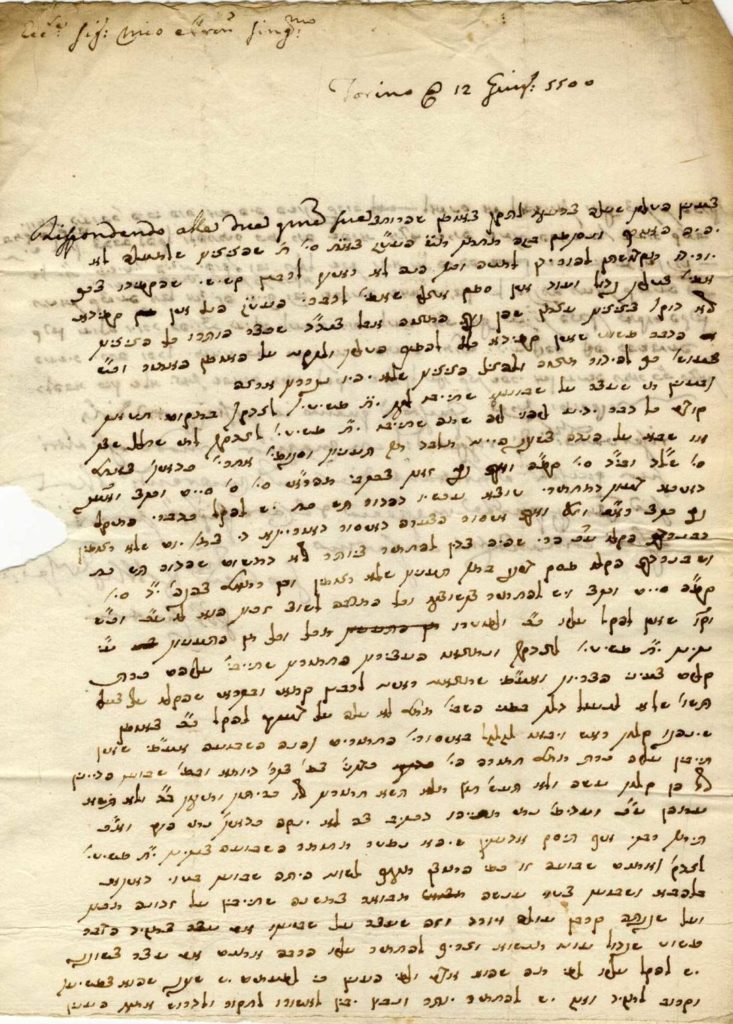
Halachic letter handwritten and signed by Rabbi Yitzchak Berachiah Canton of Torino to Rabbi Yehudah Chaim Giron with respect to changing the place of the tzitzit on a tallit and regarding one who violated an oath. Torino, 1740.
Rabbi Yitzchak Berachiah Canton was one of the rabbinical leaders of Italy. He was selected to serve as rabbi of the Torino community in 1739. He was the close friend of Rabbi Yitzchak Lampronti, author of Pachad Yitzchak , and he even gave an approbation for the book. In Shu”t Shemesh Yitzchak (Yoreh Deah siman 12) there is a responsum from him. He is also mentioned in other books by his contemporaries. He authored Yated HaOhel on Ohel Moed .
Rabbi Yehudah Chaim Giron was among the sages of Kassel, known for the letters he sent to Rabbi Yishmael HaKohen in 1777. He is mentioned in Zecher David (first essay, chapter 39).
[2] pages. 15×19 cm. High-quality paper. The vast majority is in Hebrew in Italian script; there are a few lines in a foreign language. It is folded as an envelope with the addressee’s address in Italian. Fine condition. Fold marks. Lack where the letter opens without blemish to the body of the responsum.
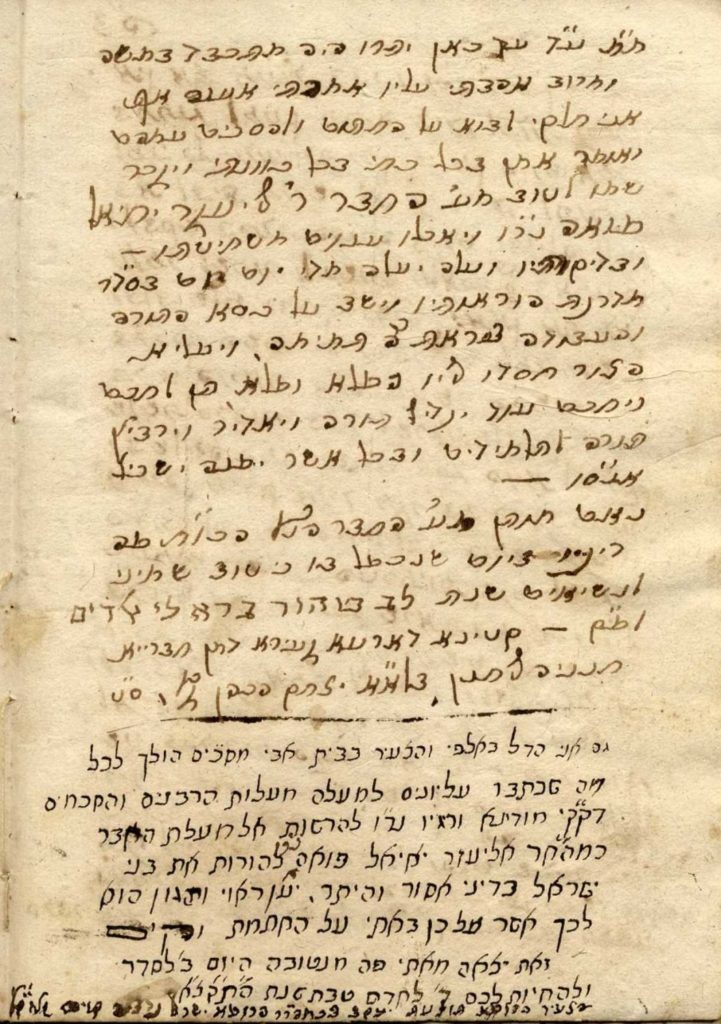
Two permits from Rabbi Elyakim son of Rabbi Avraham Fadobani of Reggio,
Two permits from Rabbi Yaakov Yisrael son of Rabbi Yedidiyah Karmi – rabbi in Reggio,
A permit from Rabbi Mazal Tov of Modena, father of Rabbi David Zakut and disciple of the author of Zera Emet ,
A permit from Rabbi Chanania Elchanan, son of my father Yitzchak HaCohen, rabbi in Reggio and Av Beit Din in Florence,
And a permit from Rabbi Yaakov son of the doctor Yisrael Gedaliah Kazis of Mantua.
The permits were written and signed in the rabbis’ handwriting, inside a beautiful ledger.
[38] pages, on which [8] are written. Ink on paper. 13×18 cm. Autographs written in Italian.
Fine-very fine condition. Original cardboard binding.
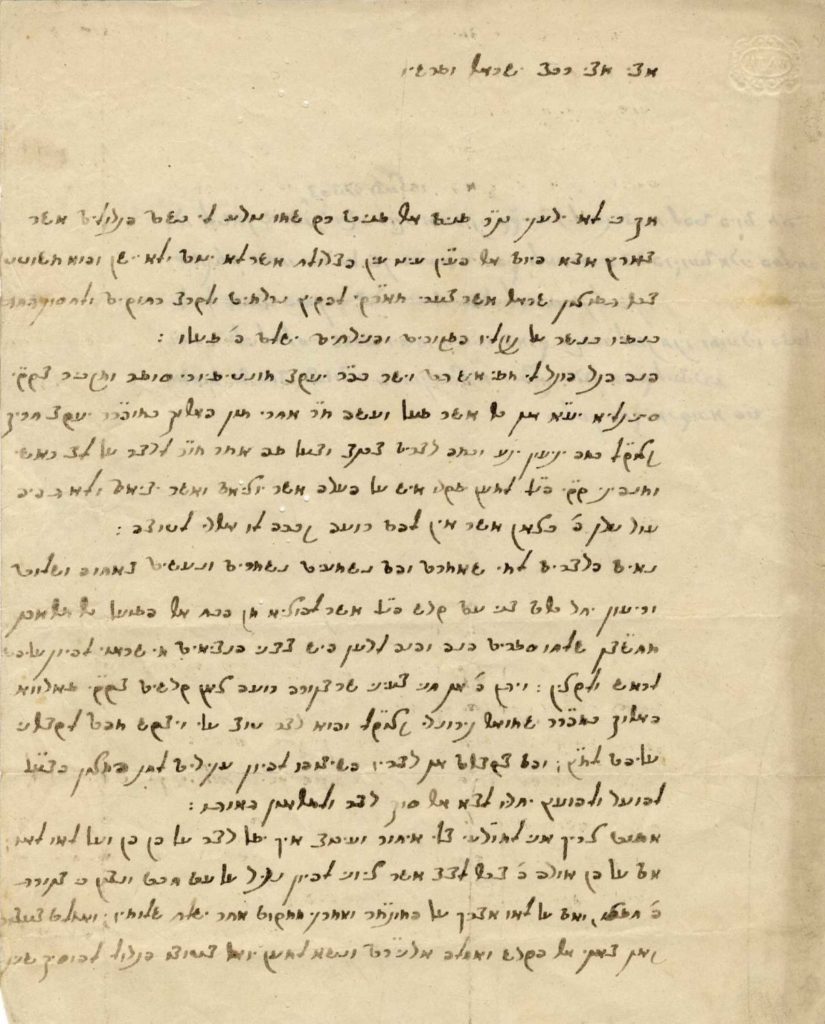
Signed and written letter by Rabbi Yosef Ancona, rabbi of Senigallia, in which he proposes himself as potential rabbi of the community. [Italy, 1854?]
Rabbi Yosef Ancona [1811-1890] served in the rabbinate of Padua, Sabbioneta, Leggio and more. He was accepted to the rabbinate of Senigallia in 1854 and he served there for 36 years, until his passing.
[2] pages. Ink on paper. 22×18 cm. Folded as an envelope with the rabbinical addressee’s address in Italian, and a postmark.
Fine condition. Few worming holes. Fold marks. Lack where the envelope opens without damage to text.
Descripti
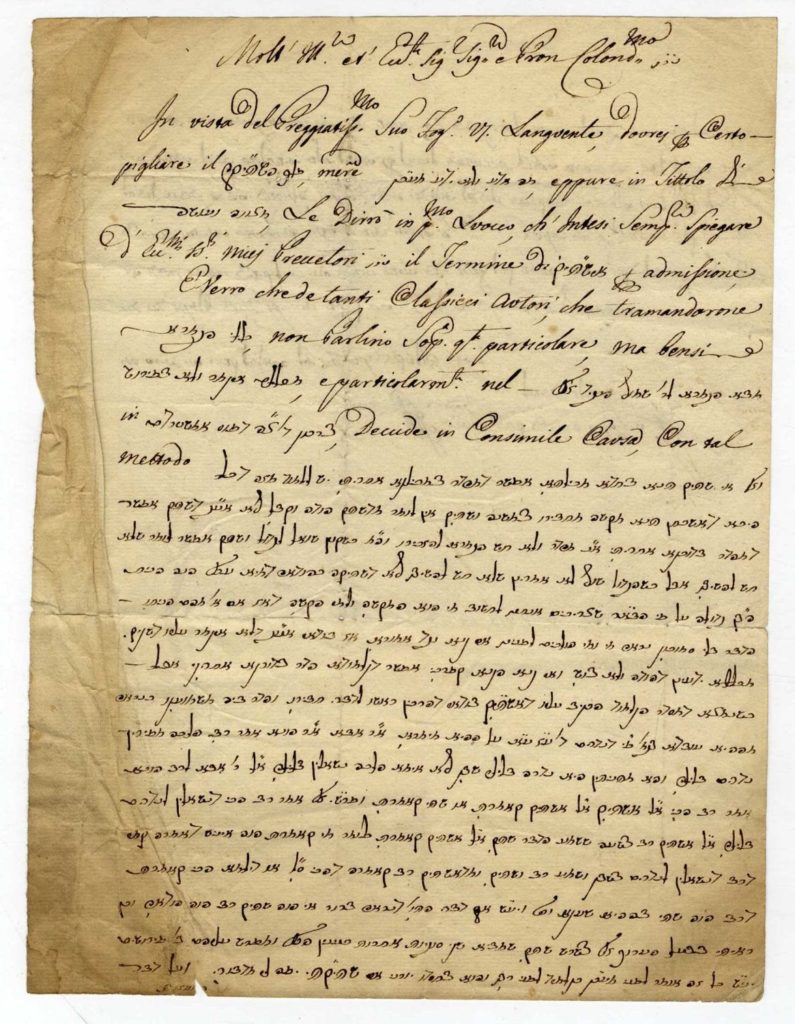
Letter on Torah and halachic issues handwritten and signed by Rabbi Yitzchak Berachiah Sangoiti to Rabbi Yehudah Chaim, Torino, 1780.
Rabbi Yitzchak Berachiah Sangoiti was born in 1745 to his father Rabbi Yechiel of Reggio, of the renowned rabbinical family in Italy. He studied with his father and with the gaon Rabbi Shimshon Nachmani, author of Toldot Shimshon and Zera Shimshon . He mentions his rabbi in the works which he left in manuscript. He served as rabbi in Vercelli, and left works in manuscript. The ones we know of are found in Machon B”Tz Jerusalem: Siach Yitzchak – commentary on Tehillim, Melech B’Yofyo – commentary on Mishlei, and another three works of sermons and commentaries copied by his disciple Rabbi Zechariah David Shabtai Segri.
Rabbi Yehudah Chaim Giron was among the sages of Kassel; he was known for the letters he sent to Rabbi Yishmael HaKohen in 1777. He is mentioned in the book Zecher David (first essay, chapter 39).
[2] pages, 18×4 cm. Almost all of the letter is in Hebrew, in Italian script. There are a few lines in a foreign language at the top of the letter. Fine condition. Aging stains. Folds. Fold marks, small tears in the folds without damage to the text.
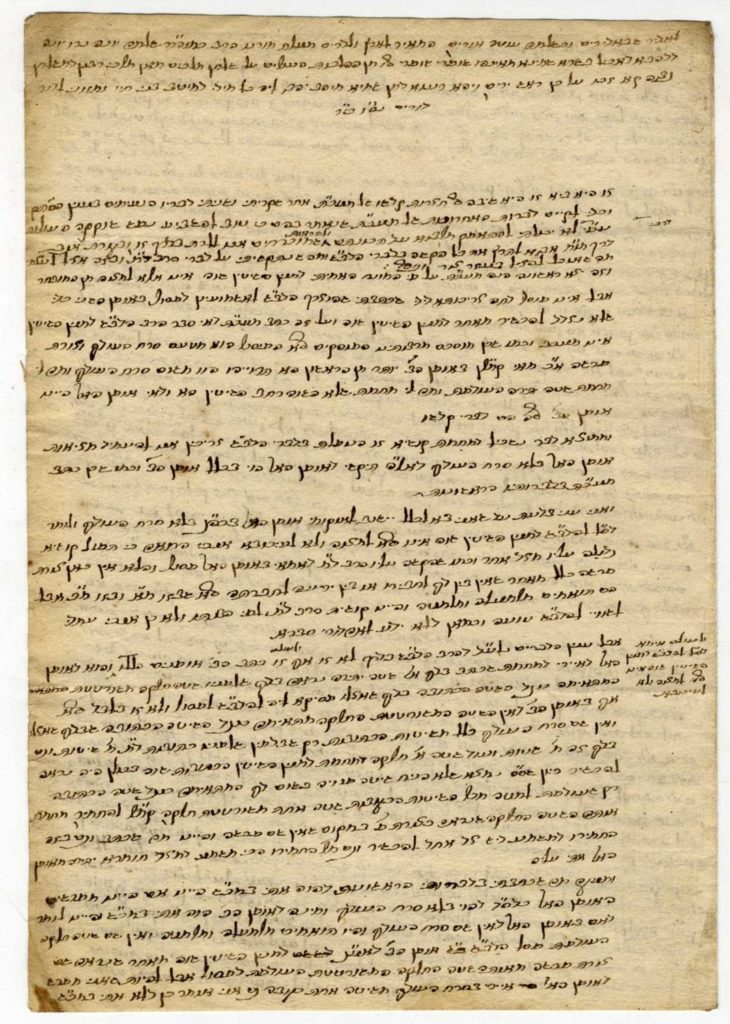
Two long halachic responsa about the kashruth of Torah scrolls, tefillin and mezuzahs, ketubahs and gittin, which were sent to Av Beit Din of Torino Rabbi Shlomo Michael Yonah of Torino.
Rabbi Ya’akov Chai Recanati author of Piskei Recanati HaAchronim [1763-1824] son of Rabbi Yitzchak Shmuel Chaim, of one of the most well-known and senior families of Italy. He was an exceptionally sharp scholar who was proficient in mathematics, grammar and several languages. He received his rabbinical ordination from Rabbi Yishmael HaKohen of Modena and served as a rabbi of many communities in Italy. He authored many works, which survived as manuscripts, among them: Afikei Mayim , Har Tov , Chelek Yaakov , Yeshuot Yaakov , Neveh Yaakov and more; however, only one of them was printed in his lifetime, Piskei Recanati HaAchronim , published Livorno in 1813.
Rabbi Shlomo Michael Yonah, Av Beit Din of Torino, was one of the leading rabbis of Italy at the time.
[3] leaves. Ink on paper. Various sizes [approximately 26×18 cm]. Written on both sides of the leaf. Autograph signed with his typical signature: “Tolaat Yaakov Chai son of Rabbi Yitzchak Shmuel Chaim Recanati”. Hebrew and Italian. Very fine condition. Aging stains.
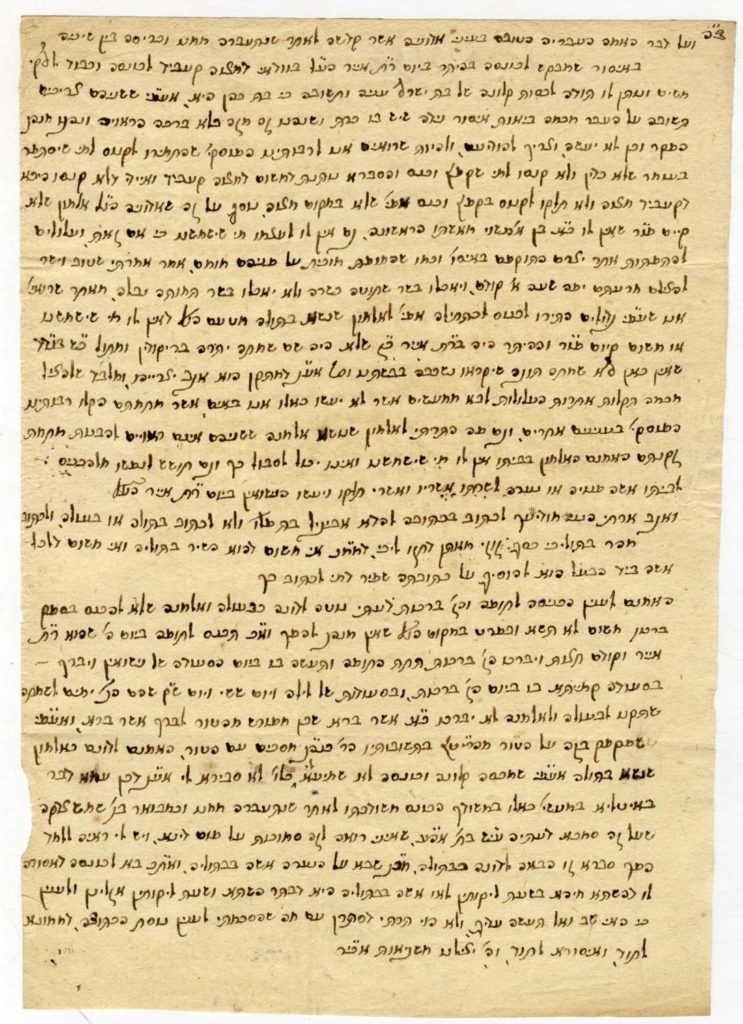
* Responsum about wedding blessings for the whole week for a young lady who had been seduced. Sent to his brother-in-law Rabbi Shlomo Michael Yonah, 1806.
* On the same topic, the ketubah text for a young lady who had been seduced and what the law is for her regarding sheva berachot.
Rabbi Yechiel Chaim Troish was among the prominent sages of Italy, serving as rabbi of Vercelli starting in 1775. The Chid”a testifies in his Maagal Tov that he met him when he was visiting in Vercelli in 1778. He was known for a question he referred to the rabbinical leaders of the generation which turned into a halachic controversy, on the topic of early recitation of liturgical poems and acceptance of Shabbat when Shmini Atzeret occurs on Shabbat. His brother Rabbi Shlomo Michael Yonah of Torino also participated in this controversy
Rabbi Shlomo Michael Yonah was the Av Beit Din of Torino. He was one of the leading adjudicators of his time in Italy, referred to as “Matkifei D’Ar’a” by Rabbi Menachem Ezra Meir of Castelnuovo in his responsa, Emek HaMelech (21b). He was born in Alessandria de la Falla, Italy, where he studied Torah under the great rabbi, expert in the revealed and hidden (aspects of the Torah), Rabbi Eliyahu HaLevi. When the Chid”a arrived on his way to his mission in Alessandria, Rabbi Michael’s soul bonded with that of the Chid”a, and they became beloved to one another. In his letters, the Chid”a expounded upon his praise – he testified regarding him that he behaves piously and in his his great love for him he calls him, “the apple of my eye” ( Iggerot V’Haskamot HaChid”a , Vaknin, pp. 56).
[2] leaves. 17×24; 26×19 cm. Dark paper, thick and high-quality. Hebrew in Latin letters. Several lines in a foreign language at the top of one of the responsa.
Fine condition.